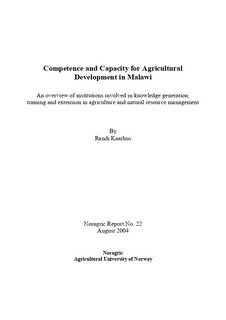Competence and capacity for agricultural development in Malawi : an overview of institutions involved in knowledge generation, training and extension in agriculture and natural resource management
Report
Permanent lenke
http://hdl.handle.net/11250/2601487Utgivelsesdato
2004Metadata
Vis full innførselSamlinger
- Reports (LandSam) [94]
Sammendrag
This report is written with the aim of being useful reading for donors, development planners and international partners in development cooperation working in the fields of agriculture and natural resource management research and outreach, institution building in tertiary education, and cross-institutional and inter-disciplinary approaches. But above all, it is written with the hope of being useful for individuals and sector institutions involved in preparing new cross-institutional and interdisciplinary linkages and collaboration in Malawi.
Malawi is one of the countries in Southern Africa that at present experiences a situation of both complex and urgent challenges – above all associated with poverty, and rural poverty in particular. In a world of commercial globalisation, 90% of the country’s export earnings come from agricultural products, while 85% of the economically active population depend on agriculture. Most of the around 11 million people in Malawi are smallholder farmers. Agricultural productivity is, however, low, and generally declining. In fact, increasing poverty among smallholders appears to be both cause and effect of low agricultural productivity. Smallholders’ poverty is closely linked to increasing pressure on land and natural resources, and it appears essential to find means to increase agricultural productivity.
Present figures indicate that 60% of households in the course of a year experience food insecurity, and it is no doubt necessary to assist smallholders to develop new opportunities for income generation. The question is: How?Is the key to solving Malawi’s problems to be found in competence and capacity building in the agricultural sector and in natural resources management? Will better training of more students in agriculture, extension and natural resources management result in improved food security at the national level? Does agricultural research and transmission of research-based knowledge eventually reach small-scale farmers and improve their livelihoods? Is research in these fields responding to smallholder farmers’ needs?
These are challenging questions in the Malawian context today. It is a context where Bunda College of Agriculture plays the role of a key institution in agricultural and natural resources management training and research. The Ministry of Agriculture, Irrigation and Food Security is, on its part, responsible for a network of agricultural research stations and for a network of (so far) public extension services. But none of these institutions have so far been able to exhibit a positive impact on smallholder agriculture at a scale that corresponds either to the ambitions of the institutions themselves or to the present challenges in rural areas. How to make the most of the science-based competence and capacity that exist in the fields of agriculture and natural resource management is actually quite an urgent issue in Malawi.
“In Malawi you cannot run away from agriculture!” is a statement that in many ways summarizes the situation. During the interviews carried out to seek information and perspectives from different stakeholders for this report, it was pronounced not by a Malawian professional in agriculture, but by a social scientist.
The present study addresses the issue of how science-based competence and capacity for agriculture in Malawi are organised and how human resources in these fields are trained and utilized. It provides an updated and analytically oriented overview of key institutions involved in science-based knowledge generation and dissemination (extension)directed at the agricultural sector in the country. The study is a first attempt to carry out such a sector-oriented competence-and-capacity mapping.
The report was originally planned to serve as a support and background document for the proposed Bunda College Development Programme, which in 2004 is being submitted to NORAD for funding. However, it is hoped that it can also be useful in the planning of future collaboration both between the institutions described here and between these institutions and external partners. It could be useful in the planning of how to prioritise resources in the further development of competence and capacity in the agricultural sector and in natural resources management in Malawi. And it may serve as an input to further planning processes at the policy-making level, both in tertiary education, in natural (and human) resource management, and in agricultural development.

